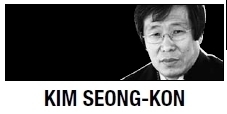 |
Sometimes we are presumptuous and foolhardy enough to take the liberty of assuming and interpreting things in our own way. Before speculating, however, we need to double check whether our assumption is right. Unfortunately, many people just do what they think is right without prior confirmation.
When my book “Literature and Film” was published in 1996, I was left embarrassed and dumbfounded. The book came out with the English title “Literature and Movie.” The book cover designer assumed that it was the right title and audaciously printed it on the front cover. Even though I was in the States at the time, he could have easily reached me either by phone or email. Yet he did not bother to ask for my opinion and as a result committed an unpardonable mistake. On seeing the awkward title, I despaired because readers would definitely assume it was I, not the designer, who came up with that awkward title. I can imagine them laughing at my poor English, “Shame on him! How could this guy become a professor of English?”
In another book of mine, “Hollywood: A Mirror of 20th Century Culture,” I included a chapter on the celebrated Stanley Kramer movie, “Guess Who’s Coming to Dinner.” When the book came out, I was horrified. I found that the title of the chapter was switched to “Guest Who’s Coming to Dinner.” Perhaps, the presumptuous editor thought I had misspelled the title and corrected it in his own considerate way. Just like the above-mentioned cover designer, he did not even bother to contact me for my confirmation.
Once again, I was in the States so I may be the one who is to blame, and yet the editor should have contacted me before he made me a laughingstock. I shuddered at the thought that readers would surely deride my ignorance, clicking their tongue, “What a shame! This guy claims he’s a film critic, and yet he doesn’t even know the exact title of a famous movie.”
Some time ago, I delivered a lecture on comparative literature and culture between the East and the West at an American university. At their request, I sent them the title of my talk, “East and West: Never the Twain Shall Meet?” I was toying with Kipling’s widely known phrase, “East is East and West is West, and never the twain shall meet.” When I arrived at the university and saw the program, I was aghast. The title was changed into, “East and West: Never the Taiwan Shall Meet?”
It turned out that someone, who was in the Korean studies program and thus not familiar with the word, “Twain,” changed it to “Taiwan,” assuming that I had misspelled the latter. Obviously, his English was not so good and he was not familiar with Kipling’s famous dictum either.
The problem was that the new title did not make any sense at all. If the lecture displayed such a title, who would come to the lecture unless he was interested in Taiwan? When I corrected the mistake before I began my lecture, the audience burst into laughter. But it was too late already. The small audience was mostly Taiwanese or Taiwan specialists.
Other times, we tend to ignore the global standard and try to do something in our own way. When I pointed out awkward English signs or names, for example, people would not listen to me. They would stubbornly insist, “We do in our own way.”
We impudently put up English signs without consulting native speakers of English. We also audaciously send business emails in English without having them proofread. It is undeniable that the invention of email has significantly improved our English writing skill. Indeed, even those whose English proficiency is poor do not hesitate to write messages in English and send them out to people overseas these days. The problem is that many emails we send overseas may be incoherent, unintentionally rude or grammatically wrong.
Personal emails do not always necessarily need to be proofread or edited. When it comes to business, however, you should send grammatically flawless, articulate and lucid messages to the other party. Otherwise, your email will seriously damage the integrity of not just your company, but also your country. Unfortunately, our emails are often full of grammatical errors, awkward expressions or even offensive remarks. Whenever I come across poorly written English emails sent by a Korean institution overseas, I am appalled. Yet we are so presumptuous and audacious that we keep sending erroneous emails all over the world.
We also assume that we know other countries such as China, Japan and the United States so well that we seldom seek advice from experts and professionals. Consequently, we make numerous mistakes when dealing with these countries. The results can be fatal to our national interest.
We need to be confident, bold and dauntless. At the same time, we should not be too arrogant, presumptuous or audacious.
Kim Seong-kon is a professor emeritus of English at Seoul National University and president of the Literature Translation Institute of Korea. ― Ed.



